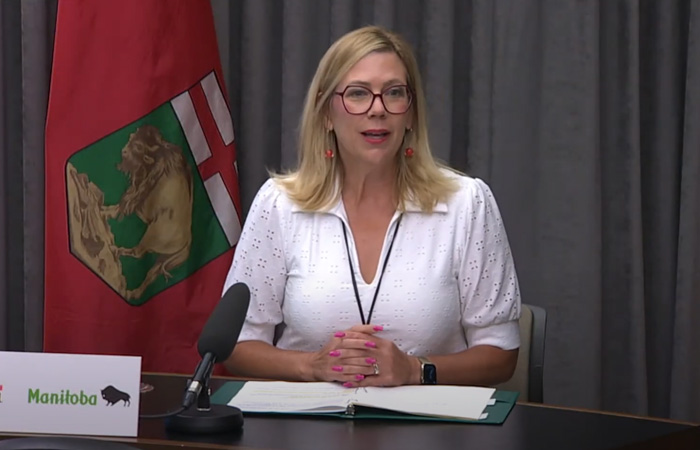The Manitoba government is helping vulnerable citizens by providing $5.4 million to community agencies as part of the province’s first whole-of-government strategy to end homelessness.
“Our government understands that addressing homelessness calls for a co-ordinated multi-faceted approach that includes community-led solutions to connect vulnerable people to the housing supports they need,” said Families Minister Rochelle Squires. “These early steps our government is announcing today will ensure community-led organizations can continue to provide culturally-appropriate services to people in need, so they can have safe places to call home and hope for the future.”
The whole-of-government strategy includes five key pillars, which have been affirmed through broad community consultation:
- modernizing the emergency response,
- ensuring housing is provided with supports,
- focusing on prevention,
- improving service navigation and delivery, and
- recognizing rural and northern needs.
Under the first pillar, new funding will be directed toward community-based organizations that are modernizing the emergency response and meeting acute needs in Winnipeg.
In November, Premier Heather Stefanson announced $1.5 million in support of N’Dinawemak, which offered warming space to up to 150 of Manitoba’s most vulnerable citizens. Today, Squires was pleased to announce the Manitoba government is providing an additional $1.872 million to sustain ongoing 24-hour operations with culturally-relevant programming.
In support of the second pillar, the Manitoba government is investing in the planned Homes for Heroes Veterans Village with $500,000 to help fund the construction of 20 tiny homes that will be serviced by on-site counselling. Additionally, $855,600 will be directed to support transitional housing services offered by the West Central Women’s Resource Centre.
The province has also committed $1 million to relaunch the Proposal Development Funding (PDF) program, which supports the development of new affordable and social housing projects while leveraging new federal funding program opportunities. The province will issue a call for applications this summer to identify successful proponents to help facilitate new housing projects.
Activities under the third pillar, including the indexation of Rent Assist and the creation of Manitoba’s first-ever rent bank, are already helping to prevent homelessness in Manitoba. The Manitoba Rent Relief Fund (MRRF) has approved more than 400 interest-free loans since the end of May 2021, helping families to remain in their homes. Further initiatives will be announced to that end, and to improve service navigation and delivery provincewide.
The minister also announced the province is helping Manitobans struggling with affordability by indexing Rent Assist benefits. Rent Assist is a shelter benefit delivered by the province for low-income Manitobans who are receiving Employment and Income Assistance (EIA) and have shelter costs, or who are renting in the community and are not receiving EIA.
Rent Assist keeps housing affordable for Manitobans with low income. Each year benefits are indexed to reflect 75 per cent of the assessed median market rent, but in 2021/22, the Manitoba government increased the indexation rate for families not enrolled on EIA to reflect 80 per cent of the median market rent.
Because of indexation, some families will see up to a 6.5 per cent increase in their monthly benefit or up to $80 more each month.
“This increase means Manitobans can afford to stay in their homes,” said Squires.
IIn support of this broad strategy, the province has also announced $1.25 million over five years to End Homelessness Winnipeg, which has played a co-ordinating role in the delivery of homelessness initiatives in Winnipeg since 2014. End Homelessness Winnipeg continues to co-ordinate access to housing and supports, as well as responses to encampments and extreme weather.
“On behalf of End Homelessness Winnipeg, I am pleased to see these investments by the Manitoba government, supporting Indigenous-led and community-based resources to address the needs of our unsheltered relatives,” said Jason Whitford, chief executive officer, End Homelessness Winnipeg. “As part of our backbone role implementing Winnipeg’s 10-Year Plan to End Homelessness, End Homelessness Winnipeg is a partner in N’Dinawemak and supporter of Velma’s House. We look forward to further announcements, investments and collaborations to address the need for low-income, supportive and transitional housing in Winnipeg, through the province’s PDF initiative and forthcoming homelessness strategy.”
The Manitoba government is committed to a homelessness strategy that includes a review of the delivery of shelter and transitional housing services for people experiencing homelessness in Manitoba. Recommendations from the review will inform provincial agreements with the goals of improving service delivery to community members, reducing red tape for organizations and providing the funds necessary to support these critical services into the future, the minister noted.
While work on the strategy is ongoing, the investments announced today align with the overall goals of the strategy and feedback gathered in the first three months of 2022 through stakeholder engagement.
The Manitoba government is also committed to the Homelessness Strategy working in a co-ordinated way with strategic plans and initiatives already underway to benefit public safety, including Manitoba Justice-supported efforts such as the Downtown Community Safety Partnership (DCSP) and the Bear Clan patrols, which recently received $200,000 in funding from the government.
“Homelessness is a complex issue which requires a co-ordinated response across a number of municipal, provincial and federal agencies and grass-roots organizations responding to the needs on the front lines.” said Justice Minister Kelvin Goertzen. “Today’s funding announcement will provide culturally-appropriate supports and services to respond to these calls in a way that ensures the safety and dignity of all Manitobans. Winnipeggers deserve to feel safe where they live, work and play, and these co-ordinated, multi-faceted measures announced by our government today will help address these concerns.”
The Department of Mental Health and Community Wellness has also released A Path to Mental Health and Community Wellness: A Roadmap for Manitoba, which includes $17.1 million in strategic investments that will benefit the whole-of-government approach to homelessness.
To read the What We Heard report on homelessness in Manitoba, visit gov.mb.ca.


